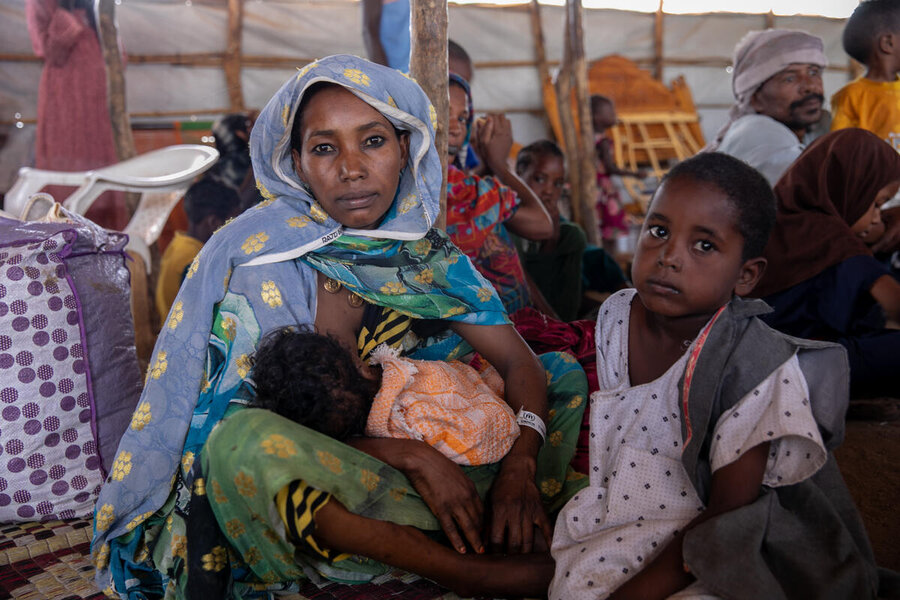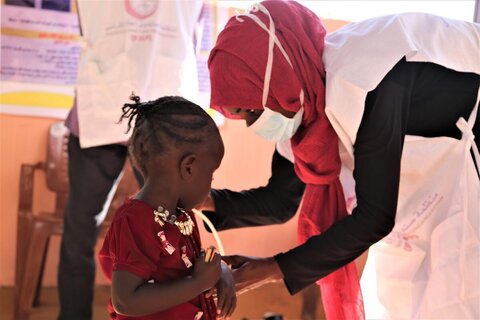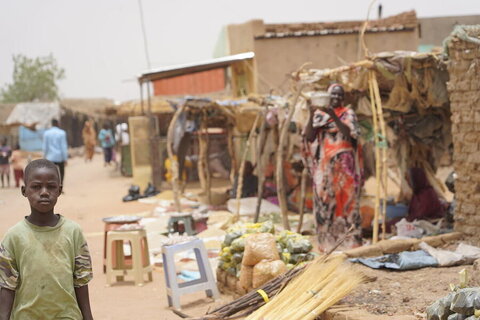Sudan updates: Floods frustrate flow of aid amid fears typhoid and cholera will spread

More than 50 trucks carrying an estimated 4,800 metric tons of World Food Programme (WFP) food and nutrition assistance – enough for around 500,000 people – are stuck in various locations across Sudan, unable to move towards their final destinations due to flooded and impassable roads.
The rainy season is exacerbating the already devastating situation in Sudan, as floods force more people from their homes, increase humanitarian needs, and cut off communities from vital assistance. Heavy rains have destroyed key bridges and made it extremely difficult for aid convoys to pass through muddy, flooded roads.
‘We can still turn the tide against hunger and famine in Sudan’

Nearly 143,000 people in 12 of Sudan’s 18 states have been affected by the floods and 50 people killed. At least 27,000 people have been displaced, according to OCHA. The extent of damage and number of people affected is likely being underreported as some of the worst flooding is in hard-to-reach conflict hotspots: Khartoum, Gezira, Kordofan and Darfur.
WFP had planned to reach half a million people with assistance transported via the Tine border crossing this month but aid trucks are currently stranded on the Chad side, with heavy rainfall making it largely impassable – some trucks have been stuck for up to two weeksone month.
The spread of waterborne diseases, like cholera and typhoid, caused by flooding is a major concern. Such diseases can be lethal to malnourished children and women, who are already bearing much of the fallout from the devasting war.
A record 3.6 million children and 1.2 pregnant or breastfeeding mothers are suffering levels of malnutrition never previously seen in Sudan.
These preventable diseases spread quickly in areas where critical infrastructure, like clean water and sanitation systems, has been damaged by conflict and in overcrowded displacement camps.
Famine in Sudan: WFP calls for unfettered access to hunger hotspots to save lives

Above-average rainfall is forecast to last until September (typically the height of the rainy season). Some forecasts warn that flooding could surpass the historic 2020 floods that hit Khartoum.
WFP has food in Sudan that we are ready to deliver to hungry people across the country. But active fighting continues to make it impossible to reach communities trapped in conflict hotspots at the scale needed to save lives and stop famine from spreading. A humanitarian ceasefire is urgently required to massively expand humanitarian access. Ultimately, an end to the conflict is the only sustainable solution. It is critical for the warring parties to leave the battlefield and show up at the negotiating table.
Since late June, fighting has spread east across Sennar and Gedaref State and continues to intensify. This could sever key routes for humanitarian assistance from Port Sudan to other parts of Sudan, as well as hinder access to WFP’s Kosti hub which is critical for aid deliveries across conflict lines to reach populations in White and Blue Nile states, the Greater Kordofan region, and parts of Darfur (South, East, North). These states include 11 famine risk areas.
There has also been an uptick of violence in Khartoum last week. In Khartoum, WFP has started using alternative ways of delivering assistance - via mobile money, cash vouchers, and support for community kitchens to provide hot meals - as it is difficult for trucks of WFP food aid to safely reach the capital. However, an urgent flow of in-kind food is still needed as food prices in Khartoum continue to spike and some community kitchens have closed because they can’t get or afford supplies.
WFP urgently needs all border crossings into Sudan to open. WFP needs to be able to use every possible supply route to deliver urgently needed food and nutrition assistance as shifting frontline lines and now severe flooding means we must constantly negotiate and secure new routes for aid convoys. This includes opening the border crossing from Adre (Chad) into West Darfur, which was announced last week, and a formal agreement between South Sudan and Sudan to transport aid from the south into Darfur, Kordofan, and Blue Nile.
The planned Geneva peace talks would offer a vital opportunity for the international community to address widespread operational challenges and access impediments directly with the warring parties obstructing aid delivery.
WFP’s emergency response in Sudan is made possible through contributions from our donors including the African Development Bank, Belgium, Canada, Cyprus, Czech Republic, the European Commission (ECHO), France, Germany, Greece, Hungary, Ireland, Italy, Japan, KS Relief, Kuwait, Luxembourg, Malta, Mohammed bin Rashid Al Maktoum Global Initiatives (MBRGI), Netherlands, Norway, South Korea, Slovenia, Spain, Sweden, Switzerland, Ukraine, the United Arab Emirates, the UN Central Emergency Relief Fund, and the United States of America.
